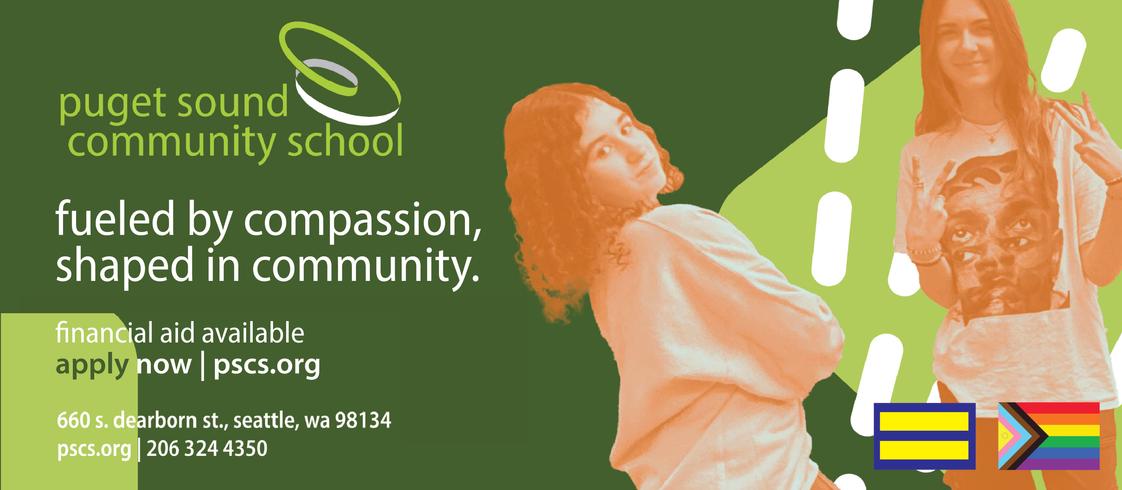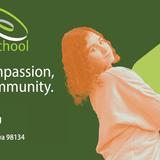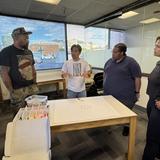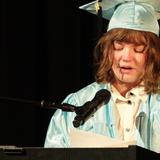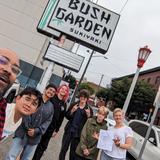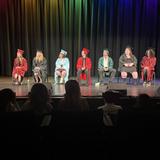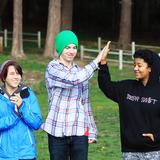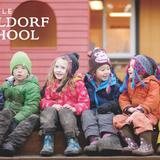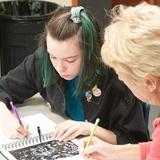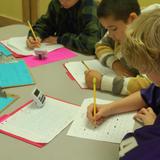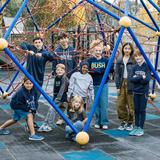Puget Sound Community School is a small, independent middle and high school in the Chinatown neighborhood of the International District, in Seattle, Washington. PSCS is committed to centering intentionally excluded perspectives in all curriculum and programming. With collaboration framing our approach, community-centered education also prioritizes the lived experience of our students, staff, and families, while offering young people opportunities to take increasing responsibility for their own education.
Quick Facts (2026)
- Top-Ranked WA School
- School Type: Alternative School
- Grades: 6-12
- Enrollment: 9 students
- Yearly Tuition: $32,773
- Acceptance rate: 90%
- Average class size: 4 students
- Application Deadline: Jan. 15 / rolling
- Source: Verified school update
Top Rankings
Puget Sound Community School ranks among the top 20% of private schools in Washington for:
Category
Attribute
Advanced Degrees
School Overview
School Type
School Membership(s)School Assoc.
Religious Affiliation
Grades Offered
Grades 6-12
ADD/ADHD Support
Yes
Year Founded
1994
School Calendar
Last Day of School
Sat. Jun 13, 2026
Student Body
Total Students
9 students
Student Body Type
Co-ed
Students by Grade
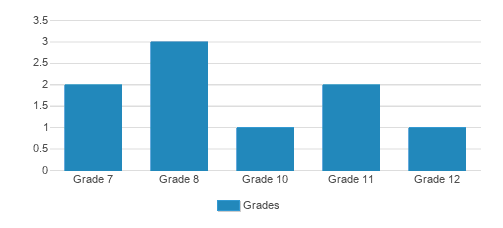
Academics and Faculty
Total Classroom Teachers
6 teachers
Student-Teacher Ratio
2:1
National avg.:
% Faculty w/Advanced Degree
100%
Average Class Size
4 students
Number of AP/Advanced Courses
1 course
List of Courses Offered
AP/Advanced Courses
AP African American History
Matriculation DataMatric. Data
Classroom Dress Code
Casual
No dress code
Tuition and Acceptance Rate
Admission Deadline
Jan. 15 / rolling
Yearly Tuition Cost
$32,773
Tuition Notes
Tuition Access is available. In the process of implementing tiered tuition as well.
% on Financial Aid
75%
Average Financial Aid Grant
$18,119
Acceptance Rate
90%
National avg.: 82%
College Acceptance Rate
90%
Admissions Director
Sieglinde Levery-Nicholas
Application URL
School Notes
- School Motto: Teach community.
- School Mascot: Otis The Octopus
Community-centered education.
Core Commitments
Practice Integrity. Engage the Community. Act with Courage.
Students at PSCS are
- Trusted to Learn: When students are trusted to take ownership of their learning, they develop a deeper sense of curiosity that drives meaningful exploration. This autonomy encourages them to ask bold questions, think critically, and pursue knowledge beyond the classroom. As a result, they grow into confident, self-directed leaders equipped to navigate complex challenges with purpose and integrity.
- Prepared for Life: Teaching life skills like collaboration, accountability, and conflict resolution equips students with the tools they need to thrive in all areas of life. By practicing these skills in real-time-whether through group projects, shared responsibilities, or managing schedules each term-students build the habits and mindsets essential for success beyond school. They graduate not just academically prepared, but ready to lead, contribute, and adapt in the workplace, in relationships, and in their communities.
- Fueled by Compassion: Compassion is at the heart of our school culture, shaping how we learn, lead, and connect with one another. By teaching honest history without erasure, we create space to prioritize lived experience and honor voices that have been intentionally excluded. This commitment fosters a community rooted in empathy, inclusion, and a shared responsibility to uplift every member.
- Shaped in Community:Through shared experiences and meaningful relationships, students develop a strong sense of identity grounded in both self-awareness and community. They learn to recognize their values, strengths, and voice while understanding how they are shaped by and contribute to the world around them. This dynamic interplay between self and community empowers students to grow with confidence, purpose, and belonging. Collaborative Leadership:At PSCS, we work to support and model for young people discerning fact from opinion, thinking critically, fostering community and resources, understanding boundaries of comfort (in order to step in to challenge), and holding compassion for both ourselves and others. As a collaborative leadership team, PSCS administrative directors and teaching staff meet every student where they're at, within the context of the larger community. Our logo, a mbius strip fashioned into a heart, is a continuous surface with no boundaries; an unending loop that connects itself to all existing possibilities. This represents for us the individual perspectives, needs, and desires of each one of us, as well as the collective needs of a community, of humanity-infinitely intertwined with no true beginning or end. We look forward to meeting those for whom this resonates, and who are interested in learning more.
Source: Verified school update
Frequently Asked Questions
How much does Puget Sound Community School cost?
Puget Sound Community School's tuition is approximately $32,773 for private students.
What is the acceptance rate of Puget Sound Community School?
The acceptance rate of Puget Sound Community School is 90%, which is higher than the national average of 82%.
What is Puget Sound Community School's ranking?
Puget Sound Community School ranks among the top 20% of private schools in Washington for: Highest percentage of faculty with advanced degrees.
When is the application deadline for Puget Sound Community School?
The application deadline for Puget Sound Community School is Jan. 15 / rolling (applications are due on Jan. 15 but additional applications are reviewed year-round as space permits ).
In what neighborhood is Puget Sound Community School located?
Puget Sound Community School is located in the Downtown Seattle neighborhood of Seattle, WA. There are 5 other private schools located in Downtown Seattle.
School Reviews
5 1/24/2025
Our family's time at PSCS was nothing short of a gift鈥攐ne we continue to be profoundly grateful for. The impact of this incredible school on my son's life has been lasting and transformative. Since graduating, he has traveled across the world, performed music on stages both big and small, taken on a leadership role at a local semi-professional soccer club, and excelled in his first year of college. But more than his accomplishments, it's how he moves through the world that stands out鈥攁 reflection of the values he cultivated at PSCS. Wherever my son goes, he builds community. He leads with integrity, acts with courage, and fosters meaningful connections. These aren't just skills he picked up鈥攖hey're values he internalized during his time at PSCS. I cannot overstate how deeply this school influenced the way he chooses to engage with his life, take responsibility for his choices, and connect with others.As a parent, I always knew my son was surrounded by a caring, supportive community of adults who genuinely saw him for who he was and who he could become. His teachers held an image of his best self and gently but firmly guided him toward that potential. PSCS gave him the freedom to explore, the courage to take risks, and the safety to grapple with tough questions. He experienced joy, had brave conversations, and learned what it means to live authentically.The maturity and leadership I see in my son鈥攁nd in every PSCS graduate鈥攃ome from the trust, responsibility, and respect this school extends to its students. Adolescence is such a critical time for young people as they shape their identities and discover how they want to impact the world. At PSCS, this process is nurtured with care, intention, and a commitment to creating empowered, compassionate individuals鈥攖he kind of people our world desperately needs more of.
5 2/11/2020
We absolutely love this school. Our daughter is very happy here after years of struggling to feel comfortable in a traditional school. She has found her peer group, is invited to pursue her passions (digital art), and is learning the key components to social justice, empathy, and kindness. The staff is fully committed to wholeness-based academics. The community is very engaging and active. The advisors work with each student individually to achieve their goals. Most of their graduates over the past 25 years have gone on to further education/university. They have a relatively new head of school who has brought in strategies and improvements that needed to be made heading into this next quarter of a century. I love their social justice focus and approve of their intentionality surrounding more focused academic goals. The student body is comprised of a variety of binary and non-binary genders and sexualities. The staff is the same and is also comprised of 50% teachers of color. I highly recommend this school to students who know the importance of social justice and environmental responsibility and whose learning goals root in their own passions.
5 8/2/2013
A small community school based on being kind and learning to love school--not just hoping to get through it.
Endorse Puget Sound Community School. Endorsements should be a few sentences in length. Please include any comments on:
- Quality of academic programs, teachers, and facilities
- Availability of music, art, sports and other extracurricular activities
- Academic or athletic awards
Recent Articles

Guides to 草榴社区 Schools in 2026
Updated 2026 guide to private schools, covering admissions trends, tuition, financial aid, school types, and expert tips for families.

Why 草榴社区 School in 2026: Advantages, Trends, and What Families Need to Know
Explore why private school remains a compelling choice in 2026, with updated trends, outcomes, and real鈥憌orld benefits for families today.

Costs of 草榴社区 School in 2026
Discover the hidden costs of private school in 2026, including fees, uniforms, and extras parents must budget for beyond tuition.

